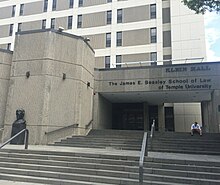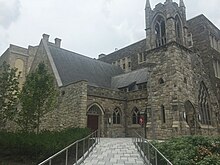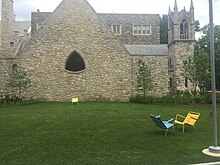Temple University Beasley School of Law
| Temple University Beasley School of Law | |
|---|---|
 Klein Hall - The James E. Beasley School of Law | |
| Parent school | Temple University |
| Established | 1895 |
| School type | Public law school |
| Parent endowment | $513.6 million (2016)[1] |
| Dean | Gregory Mandel |
| Location | Philadelphia, Pennsylvania, United States |
| USNWR ranking | 53rd (2022)[2] |
| Website | www |
 | |
The Temple University James E. Beasley School of Law is the professional graduate law school of Temple University, located in Philadelphia, Pennsylvania. Founded in 1895, the law school has an enrollment of about 530 students.
Student body[]
Admission for fall 2019 entering class was highly competitive, with 232 applicants being enrolled from a pool of 2,350. The median GPA was 3.56 and the median LSAT score was 161. The 25th/75th percentile of entrants had GPAs of 3.28/3.72, and LSAT scores of 158/163.[3] The class represented 113 different colleges, and came from 32 states and countries. Women were 49% of the class, 34% were students of color, and the average age was 26.[4]
Faculty[]
Temple Law School employs 68 full-time faculty members and retains numerous local attorneys as adjuncts. The faculty is well balanced and diverse. Gregory N. Mandel, a noted intellectual property law scholar, was named dean in May 2017.[5] JoAnne A. Epps, a professor at Temple Law since 1985, was dean from 2008 to 2016, when she was appointed provost of Temple University. Robert J. Reinstein was dean of the law school from 1989 to 2008.
Specialized coursework[]
- Integrated Trial Advocacy Program (ITAP)
- Integrated Transactional Program (ITP)
- The Law & Public Policy Program
Study abroad programs[]
Temple Law School offers two study abroad programs that are open to students from any ABA approved law school: the summer session in Rome and the spring semester in Tokyo (at Temple University Japan). The Tokyo program is perhaps the most notable, as it is the only ABA-accredited semester program for law students in Japan.
Additionally, Temple JD students are eligible to study at the following partner institutions: Tsinghua University, University College Cork, Tel Aviv University, Utrecht University, Jindal Global Law School, University of Lucerne, InterAmerican University, Bocconi University, and University of Muenster.
Study abroad credits from any program can be used toward the J.D. program or the joint JD/LL.M. in Transnational Law.
Graduate law programs (LL.M., S.J.D., Certificate, Teaching Fellowship)[]
The Law School offers several advanced degree programs, including Master of Laws Degree (LL.M.) in trial advocacy, transnational law, Asian law and taxation. Certificate programs in estate planning and employee benefits are offered through the taxation program. International lawyers have the opportunity to design their own curriculum through Temple's General LL.M. program. In addition to the LL.M., Temple offers an advanced degree for aspiring scholars, the Doctor of Juridical Science (S.J.D.), and a Graduate Teaching Fellowship program.
- LL.M. in trial advocacy
- LL.M. in transnational law
- LL.M. in taxation
The Graduate Tax Program is designed to provide understanding of complex taxation issues. The program provides candidates with a strong foundation in tax law, as well as the opportunity to develop expertise beyond the level of study offered in J.D. programs. A degree candidate must satisfactorily complete 24 credit hours of course work, including all core curriculum requirements and a writing seminar. Candidates may study on a full-time or part-time basis and all coursework must be completed within four years of matriculation. Applicants must have satisfactorily completed a basic income tax course in law school or demonstrated comparable work experience. An applicant who cannot meet this requirement must take the basic course in taxation offered in Temple's J.D. program in the student's first term after admission to the LL.M. program.
LL.M. in Asian law[]
Temple's LL.M. in Asian law is designed for J.D. holders and students who wish to focus on the law of Asian countries, particularly China, Japan and India, the more powerful economies of the region. Students complete the first of two semesters at the Philadelphia campus, taking foundational courses such as Chinese law, Japanese law and law in Asia. Students are then required to spend the second semester at one of either Temple University Japan in Tokyo, Jindal Global Law School in the National Capital Region (Delhi) of India, or Tsinghua University Law School in Beijing, China. Students must maintain a G.P.A. of at least 2.50 (out of 4.0) over the course of the 24 credits they must earn to graduate.
General LL.M. for international lawyers[]
Temple offers a general studies LL.M. program for foreign-trained lawyers. With the exception of two required research and writing courses, students can design their own curriculum from more than 180 courses offered annually in American and international law. General LL.M. degree candidates must successfully complete 24 credit hours of course work with a cumulative grade point average of 2.0 (out of a possible 4.0). The program can be completed in two semesters beginning in August and continuing to May. In addition to the main campus in Philadelphia, the General LL.M. is offered in Tokyo and Beijing. Students may transfer up to four credits at Temple's six-week summer law program in Rome, Italy, to the main campus L.L.M.
Doctor of Juridical Science[]
The Doctor of Juridical Science is a research-oriented degree program designed for those seeking to pursue careers as law teachers and scholars of law. Candidates enrolled in the S.J.D. program are required to spend their initial academic year in residence at the main campus in Philadelphia.
Estate planning and employee benefits certificates[]
An Estate Planning Certificate and Employee Benefits Certificate is offered through the Graduate Tax Program for practitioners who do not wish to pursue an LL.M. degree. The Estate Planning Certificate (exposes students to federal estate, gift and generation-skipping taxation issues, as well as federal income taxation of trusts and estates.
Law School organizations[]
Moot Court[]


Temple Law's Moot Court was started in the 1950s. Moot Court members are selected as second-year law students through the Samuel L. Polsky Selection Competition, which is held during the fall semester. Polsky participants research and write an appellate brief, then argue both sides of the case before experienced attorneys who serve as appellate court justices. Students receiving the highest scores for brief writing and oral argument are invited to join the society.
Law journals[]
Temple Law has two student-edited journals and law reviews. The Temple Law Review is published quarterly and the Temple International and Comparative Law Journal is published on a bi-annual basis.
Employment statistics[]
According to 2021 U.S. News & World Report, 59.8% of the graduating class obtained jobs at graduation, 83.3 acquired jobs in 10 months after graduation.[6] Temple's Law School Transparency under-employment score is 16.3%, indicating the percentage of the Class of 2016 unemployed, pursuing an additional degree, or working in a non-professional, short-term, or part-time job ten months after graduation.[7]
Rankings and recognition[]
- In 2021, U.S. News ranked Temple Law the 53rd best law school in the country.[8]
- Above the Law ranked Temple Law 43rd in its annual "Top Law Schools" report for legal employment outcomes in 2015, 2016, 2017 and 2019.[9]
- National Law Journal ranked Temple Law as a top law best school in its annual report for 2019.[10] The law school ranked 19th for alumni who were promoted to partnership in 2015.[11]
- Super Lawyers ranked Temple Law as 6th in Highest Caliber Graduate and Most Prepared to Practice.[12]
- In 2020, Temple's Pennsylvania Bar Examination passage rate was 81.3% for first time takers.[13]

Notable alumni[]
- Lynne Abraham (1965), former district attorney of Philadelphia.[citation needed]
- Mari Carmen Aponte (1975), appointed by President Barack Obama to the position of U.S. Ambassador to El Salvador.[citation needed]
- Amy Banse (1987), president of Comcast Interactive Media.[citation needed]
- Susan Paradise Baxter (1983), judge of the United States District Court for the Western District of Pennsylvania
- Louis Bechtle (1954), judge of the United States District Court for the Eastern District of Pennsylvania
- Edward G. Biester, Jr. (1955), U.S. House of Representatives from Pennsylvania (1967–1977); Attorney General of Pennsylvania (1979–1980); judge, Bucks County Court of Common Pleas (1980–2006); U.S. Court of Military Commission Review (appointed September 2004).[14]
- Pat Browne, Pennsylvania senator for the 16th district.[15]
- Albert E. Burling, justice of the Supreme Court of New Jersey
- Jim Cawley, 32nd Lieutenant Governor of Pennsylvania.[16]
- Ellen Ceisler, judge on the Commonwealth Court of Pennsylvania[17]
- Thomas M. Foglietta (1952), former member of the U.S. House of Representatives for Pennsylvania's 1st congressional district.[18]
- Philip Forman (1919), judge of the United States Court of Appeals for the Third Circuit, formally granted United States citizenship to Albert Einstein and Kurt Gödel
- Abraham Lincoln Freedman (1926), judge of the United States Court of Appeals for the Third Circuit
- Mitchell S. Goldberg (1986), judge on the U.S. District Court for the Eastern District of Pennsylvania.[19]
- James Henry Gorbey (1949), United States federal judge
- Clifford Scott Green, former judge on the U.S. District Court for the Eastern District of Pennsylvania.[20]
- Martin A. Herman (1963), politician who served in the New Jersey General Assembly, where he represented the 3rd Legislative District from 1974 to 1986, and was later appointed as a judge in New Jersey Superior Court in Gloucester County.[21]
- Herbert J. Hutton (1962), judge of the United States District Court for the Eastern District of Pennsylvania
- George R. Johnson (1955), Pennsylvania State representative for the 166th district (1967–1972)
- Barbara S. Jones (1973), judge of the United States District Court for the Southern District of New York
- Kathleen Kane (1993), first female attorney general of Pennsylvania; first Democrat elected as attorney general of Pennsylvania; first incumbent attorney general of Pennsylvania to be convicted of a felony while in office.[22]
- James McGirr Kelly (1957), judge of the United States District Court for the Eastern District of Pennsylvania
- Robert F. Kelly (1960), judge of the United States District Court for the Eastern District of Pennsylvania
- Chad F. Kenney (1980), judge of the United States District Court for the Eastern District of Pennsylvania
- Mark Levin (1980), chief of staff to Attorney General Edwin Meese and nationally syndicated radio host.[23]
- Jose L. Linares (1978), judge of the United States District Court for the District of New Jersey.[24]
- Mary M. Lisi (1977), judge of the United States District Court for the District of Rhode Island.[25]
- Joseph J. Longobardi (1957), judge of the United States District Court for the District of Delaware
- John W. Lord Jr. (1928), judge of the United States District Court for the Eastern District of Pennsylvania
- Alan David Lourie (1970), judge of the United States Court of Appeals for the Federal Circuit
- Albert Branson Maris (1918), judge of the United States Court of Appeals for the Third Circuit
- Seamus McCaffrey, justice on the Supreme Court of Pennsylvania.[26]
- James P. McGranery (1928), 61st United States Attorney General, United States Representative for Pennsylvania's 2nd District, judge of the United States District Court for the Eastern District of Pennsylvania
- Pat Meehan, former United States House of Representatives, Pennsylvania 7th District; former United States Attorney for the Eastern District of Pennsylvania.[27]
- Cecil B. Moore, (1951) civil rights activist, and former member of Philadelphia City Council.
- James M. Munley (1963), judge on the United States District Court for the Middle District of Pennsylvania.[28]
- Drew O'Keefe - U.S. Attorney for the Eastern District of Pennsylvania[29]
- John R. Padova (1959), judge of the United States District Court for the Eastern District of Pennsylvania
- Lowell A. Reed Jr. (1958), judge of the United States District Court for the Eastern District of Pennsylvania
- Leon Rose, basketball sports agent. Clients have included LeBron James and Allen Iverson.
- Allen Rosenberg, rower and rowing coach[citation needed]
- Timothy J. Savage (1971), judge on the United States District Court for the Eastern District of Pennsylvania.[30]
- Martin J. Silverstein (1979), United States Ambassador to Uruguay,[31]
- Richard A. Snyder, Pennsylvania State Senator for the 13th district from 1961 to 1984
- William Henry Stafford Jr. (1956), judge of the United States District Court for the Northern District of Florida
- John F. Street (1975), former mayor of Philadelphia.[32]
- Charles Swift (1999 L.L.M.), a lieutenant commander in the U.S. Navy, Judge Advocate General's Corps.[citation needed]
- Petrese B. Tucker (1976), judge on the United States District Court for the Eastern District of Pennsylvania.[33]
- David Urban (J.D.), political commentator and lobbyist.[34]
- Franklin S. Van Antwerpen, judge on United States Court of Appeals for the Third Circuit, former judge on the United States District Court for the Eastern District of Pennsylvania.[35]
- James "Jim" Walden (1991), former Assistant U.S. Attorney for the Eastern District of New York and founder, Walden Macht & Haran LLP[36]
- Charles R. Weiner (1949), judge of the United States District Court for the Eastern District of Pennsylvania
- Joseph Putnam Willson (1931), judge of the United States District Court for the Western District of Pennsylvania
- Lloyd H. Wood, 20th Lieutenant Governor of Pennsylvania from 1951 to 1955
See also[]
- Pennsylvania Law Schools
References[]
- ^ As of October 31, 2016. "Temple endowment exceeds $500 million". Temple Now. November 28, 2016.
- ^ "Temple University (Beasley)".
- ^ "ABA Required Disclosures" (PDF). Temple Law. Retrieved January 31, 2020.
- ^ "Profile of Entering Class". Temple Law. Retrieved January 31, 2020.
- ^ "Professor Gregory N. Mandel Appointed Dean - Temple Law". July 15, 2016. Retrieved July 26, 2016.
- ^ "US News and World Report 2021".
- ^ "Temple University Profile".
- ^ "2021 Top Law Schools".
- ^ "The 2017 ATL Top 50 Law School Rankings". Retrieved July 28, 2016.
- ^ "The Top 50 Go-To Law Schools". Retrieved July 28, 2016.
- ^ "The Top 50 Go-To Law Schools". Retrieved July 28, 2016.
- ^ "Can you get a job after graduation". Super Lawyer. April 6, 2015.
- ^ "US News and World Report Bar Passage Rate". October 18, 2013. Retrieved July 31, 2016.
- ^ "Edward G. Biester, Jr". Biographical Directory of the United States Congress.
- ^ "Pat Browne". Project Vote Smart. Retrieved February 26, 2013.
- ^ "Jim Cawley". Project Vote Smart. Retrieved February 26, 2013.
- ^ "Judge Ellen Ceisler". Unified Judicial System of Pennsylvania. Retrieved August 4, 2020.
- ^ "Thomas M. Foglietta". Biographical Directory of the United States Congress. Retrieved February 28, 2013.
- ^ "Mitchell S. Goldberg". Federal Judicial Center. Retrieved February 28, 2013.
- ^ "Clifford Scott Green". Federal Judicial Center. Retrieved February 28, 2013.
- ^ Manual of the Legislature of New Jersey, 1984 edition, p. 239. J. A. Fitzgerald, 1984. Accessed September 9, 2016. "Martin A. Herman, Dem., West Deptford Assemblyman Herman was born in Philadelphia on June 30, 1939. He was graduated from Temple University in 1960, and from its law school in 1963."
- ^ "Kathleen Kane". Project Vote Smart. Retrieved February 28, 2013.
- ^ "Mark Levin". Notable Names Data Base. Retrieved February 28, 2013.
- ^ "Jose L. Linares | District of New Jersey | United States District Court". www.njd.uscourts.gov. Retrieved July 29, 2016.
- ^ "Mary M. Lisi". Federal Judicial Center. Retrieved February 28, 2013.
- ^ "Seamus McCaffrey". Notable Names Data Base. Retrieved February 28, 2013.
- ^ "Pat Meehan". Biographical Directory of the United States Congress. Retrieved February 28, 2013.
- ^ "James Martin Munley". Federal Judicial Center. Retrieved February 28, 2013.
- ^ "D. O'Keefe, 73, former prosecutor". Philadelphia Inquirer. 1989-06-19. p. 42. - Clipping from Newspapers.com
- ^ "Timothy J. Savage". Federal Judicial Center. Retrieved February 28, 2013.
- ^ "Martin J. Silverstein Ambassadorial Post Uruguay, 2001 – 2005". Council of American Ambassadors. Archived from the original on March 11, 2012. Retrieved January 30, 2013.
- ^ "John F. Street". Notable Names Data Base. Retrieved February 28, 2013.
- ^ "Petrese B. Tucker". Federal Judicial Center. Retrieved February 28, 2013.
- ^ "Meet Pa.'s David Urban, Trump tactician and 'traffic controller' at RNC". The Philadelphia Inquirer. July 20, 2016.
- ^ "Franklin Van Antwerpen". Federal Judicial Center. Retrieved February 28, 2013.
- ^ "Jim Walden (LAW '91) - Temple Law School - Advocacy is..." Temple Law School - Advocacy is... Retrieved December 14, 2017.
External links[]
- Law schools in Pennsylvania
- Temple University
- Educational institutions established in 1895
- 1895 establishments in Pennsylvania
